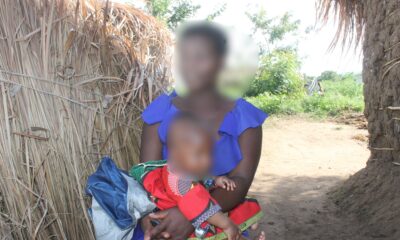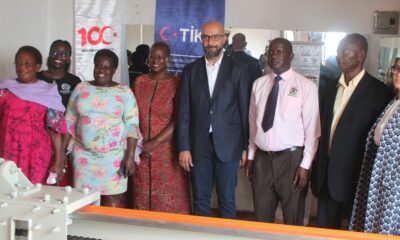Gender
MENSTRUAL HYGIENE: THE SILENTHURDLE GIRLS IN RURAL SCHOOLS GRAPPLE WITH
As parents prepare for the second term of 2024 school calendar, so are the leaners! In many ways, life is a journey where nearly everyone contends with a mountain that they will have to surmount first to reach the peak of achievement. For the majority, one surest highway to reaching their Promised Land is through education. However, our socio-economic backgrounds put us in different places, with some, sadly, offering little hope of reaching our destiny safely, without delay, or even falling off the cart. Whereas government can be commended for extending social services, including education, to rural areas, it is correct to note that a child in an urban setting has comparative advantage over their rural counterpart, when looking at the dynamics that make effective service delivery, in this case, education.
In the heart of rural Ugandan communities, where education would stand as the beacon of hope for social growth, a pervasive yet silent struggle threatens to shatter the dreams of young girls. The often-overlooked challenge is menstrual hygiene management. “Menstrual hygiene: the silent hurdle girls in rural schools grapple with”, unveils the hidden barriers that hinder consistent school attendance for female students, and sheds light on the urgent need for awareness and action in the country.
Uganda, like many other developing countries, grapples with taboos surrounding menstruation. In rural areas, the inadequate and improper education facilities exacerbate the problem. Limited access to sanitary products (girls resort to use of materials like old recycled cloth, leaves etc) and private, hygienic spaces leads to girls missing school days, monthly,which significantly impacts their academic performance and overall well-being.
For these young girl-learners, the monthly cycle becomes a source of anxiety rather than a routine aspect of life. Cultural stigmas surrounding menstruation further isolate them, making it difficult to seek support or even discuss their struggles openly. Consequently, absenteeism becomes inevitably rife, perpetuating a cycle of missed opportunities and limited educational attainment. In one of the studies conducted in the country in 2018 by Miiro et al, 17.3% of the girls interviewed gave menstruation as the main reason for missing school. Furthermore, the Ministry of Education and Sports’ Situation Analysis conducted in 2020 revealed struggles faced by girls to manage their menstruation amidst a non-supportive environment. Relatedly, in another study (unpublished) conducted by the writer in Kyankwanzi district, for the Masters’ Degree program, 26.9% of the girls interviewed had missed school due to reasons related to menstruation.
To address this issue, a comprehensive approach is necessary. Firstly, raising awareness within communities about menstrual health is critical to dispel myths and break the silence surrounding the topic. Educational programs, tailored to the different cultural contexts within the country, should be implemented not only in schools, but also within the broader community to foster understanding and support. The ministry of Education, through its School Health Policy and Menstrual Health and Hygiene Strategy, should highlight the component of self-esteem/confidence building sessions and revisit its curricula to ensure learning activities promote self-esteem in an effort to curb absenteeism among girls.
Infrastructure improvements are equally imperative. Schools must be equipped with adequate clean and private sanitation facilities (including disposal bins, water, soap and bath spaces); and access to affordable and eco-friendly menstrual products should be prioritized. Collaborative efforts between the government, non-profit organizations, religious leaders, cultural leaders and local communities can play a pivotal role in implementing sustainable solutions.
As we discuss the silent struggles faced by rural schoolgirls in Uganda, it is crucial to recognize the correlation between menstrual hygiene management and the broader goal of achieving universal education. By dismantling these barriers thereof, we pave the way for a future where every Ugandan girl can attend school, free of aforesaid silent struggles and thereby realizing her full potential in a supportive and empowering environment.
The author is an advocate for Health Promotion and Environmental Conservation
By: Kaziro Douglas
Email: dkaziro@gmail.com
Twitter: @dkaziro




































